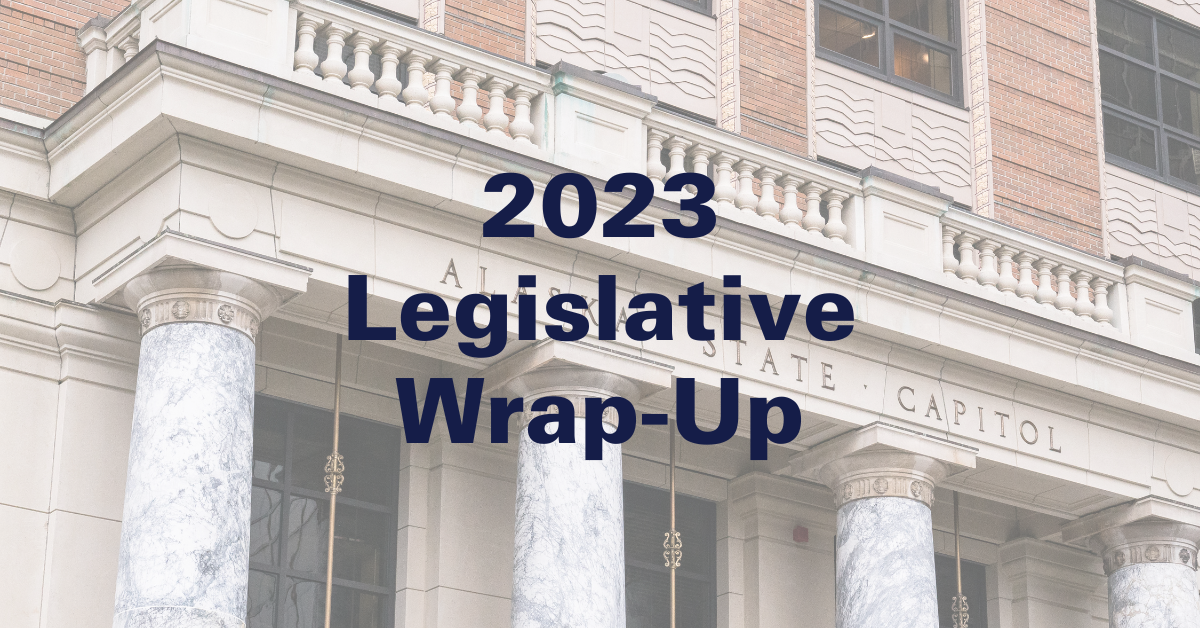By Erick Cordero Giorgana, Bethany Marcum and Carmela Warfield
The first regular session of the 33rd legislature adjourned on May 17, 2023, with a one-day special session on May 18.
Thirty-one bills were passed by both bodies, and as of this writing, one was vetoed and three were signed into law. The first expedited the appropriation of state and federal funds to address backlogs in public assistance processing, including Supplemental Nutrition Assistance Program (SNAP) benefits. The second bill allows for the development of carbon offset projects and carbon management initiatives on state lands, and is intended to create new private sector jobs and new revenue sources for the state. The third repeals future sunset dates for the Renewable Energy Fund, a grant program established by the legislature in 2008 to support the development of renewable energy projects in Alaska.
As for the remaining twenty-seven bills passed in 2023, readers should remember that the Governor maintains veto authority and nothing is final until signed into law.
The total number of bills passed during this first year of the two-year legislature is comparable to numbers passed in the first year of other legislatures.
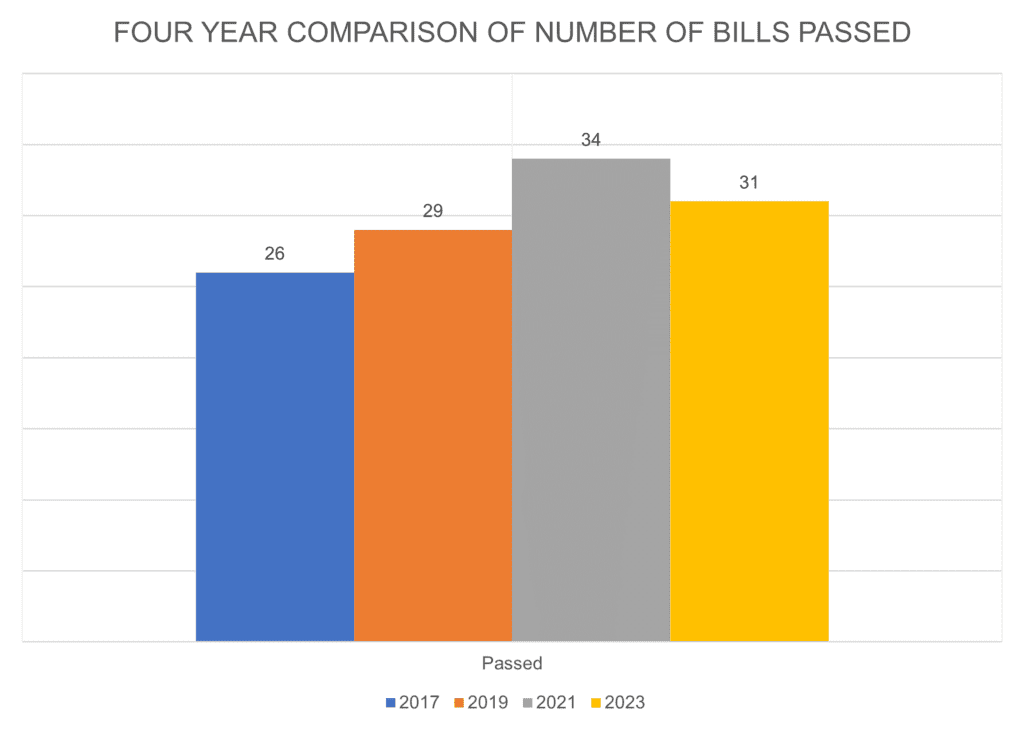 Figure 1
Figure 1
Legislators made positive progress towards increasing opportunities for economic prosperity in our great state by passing a bill that repealed the requirement that applicants for an Alaska Commercial Driver’s License (CDL) to hold a regular Alaska driver’s license for at least one year before they can begin the process of obtaining a CDL. Given that comprehensive, federal- required safety and training standards are in place for obtaining a CDL, this bill removed a redundant barrier to workforce development.
On the health care front, there was progress but no resolution on direct health care, an important free market reform. The Senate passed a rather distorted version of a direct health care bill but the House did not vote on it. The other significant health care policy, certificate of need repeal, didn’t make notable headway.
Over twenty bills related to taxation were introduced, mostly to create new or increase current taxes. Alaskans will be relieved to know that none passed – yet. But all are still in play for a potential special session and for when the legislature reconvenes in January 2024.
An outstanding bright spot was the passage of a bill that prevents state and municipal governments from closing gun stores and shooting ranges during disaster emergency declarations while other retailers remained open. This would be enforced statewide and give Alaskans peace of mind that they can defend themselves and provide for their families and communities, especially during unprecedented times of emergency.
APF was discouraged to see the outcome of the special session vote on the most important task of the legislature, the Fiscal Year 2024 budget. The legislature irresponsibly authorized spending of $8.06 billion in state funds, which is almost 10% more than last year’s state-funds budget, and 4.5% more than our Responsible Alaska Budget recommendation.
Part of that appropriation includes the largest ever one-time increase in education funding—a blank check of new money for school districts which are still sitting on millions of dollars in federal COVID funding, and which have no accountability in place for Alaska’s last-in-the-nation academic outcomes. Even so, this was preferable to a bill aimed at increasing the annual base student allocation. Although amendments to the bill were offered to direct the increased education funding to teachers and classroom instruction, and to improved student outcomes, these amendments were not adopted.
We have written extensively on the critical need to improve student learning outcomes statewide. We strongly encourage legislators who want funding increases to include policies that give teachers the support they need to implement improvements and early literacy laws effectively, and to require improved learning outcomes for Alaska’s children.
There is some good fiscal news: the budget won’t be hit this year with hundreds of millions more in defined benefits pension costs—those bills received an immense amount of attention but none passed—yet.
Election policy is certainly in the news, but not so much in Juneau. With over thirty election-related bills filed, including three which would repeal ranked-choice voting, it was expected there would be hearty consideration. Unfortunately, there was very little activity on these bills.
While introducing and passing legislation is not necessarily an indication of a policymaker’s effectiveness, we thought it would be interesting to look at the data. Overall in 2023, 361 bills were introduced; individual legislators introduced 265, while committees introduced 96. A total of 31 bills passed both chambers. Many of the committee bills that passed were requested by the governor (Note: our analysis reflects only actual bills, not resolutions).
Number of Bills Passed by Individual Legislators
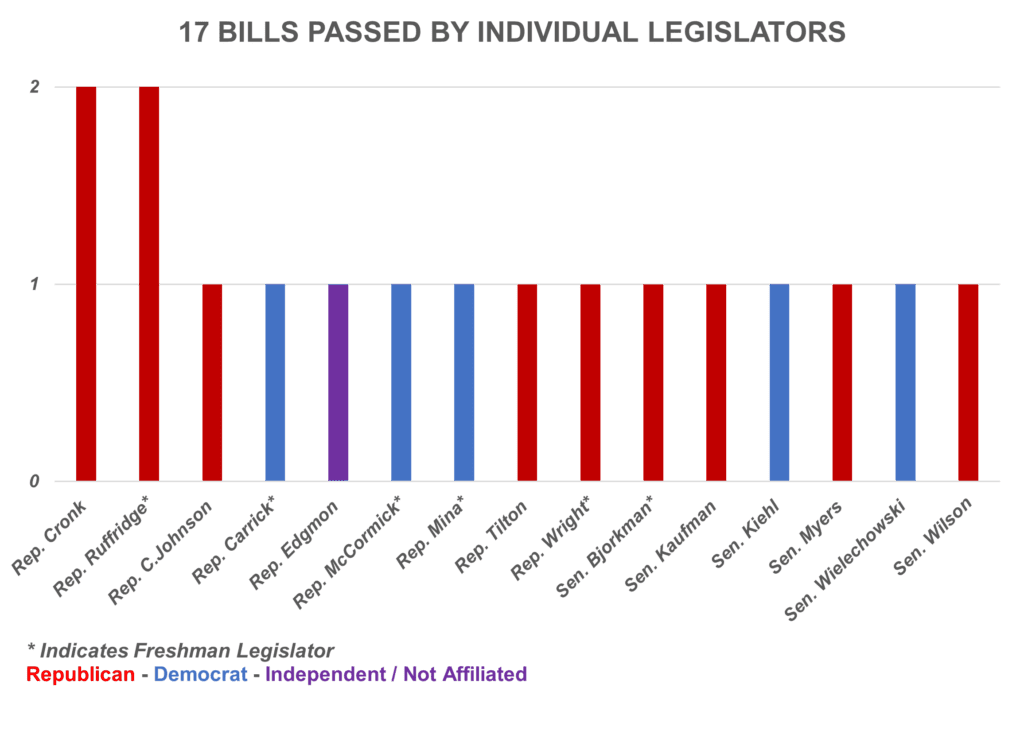 Figure 2
Figure 2
Number of Bills Passed by Committees
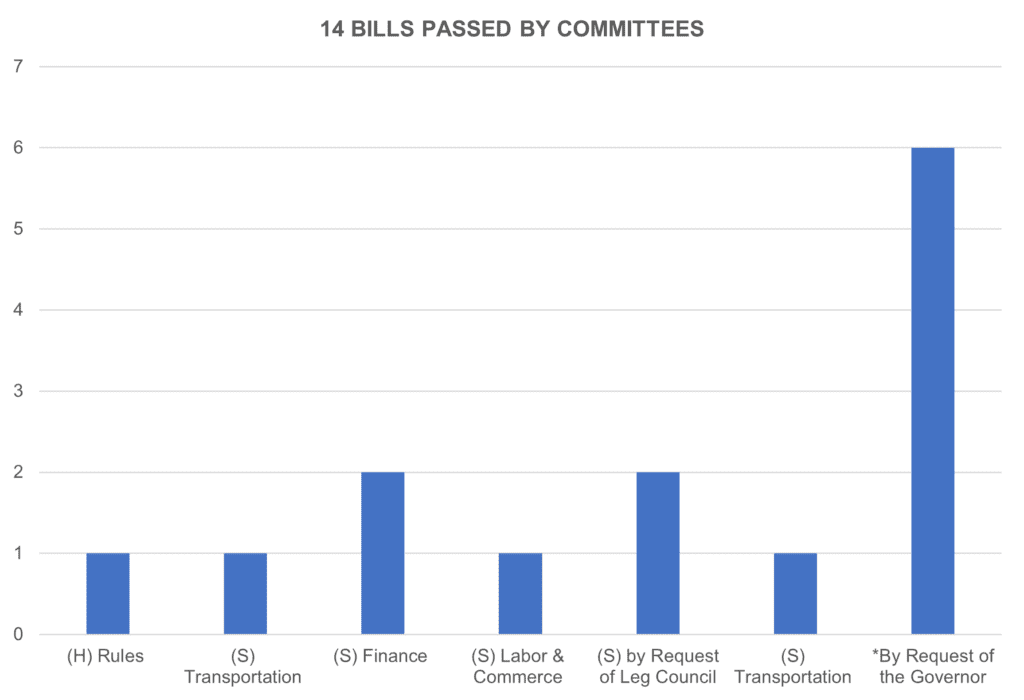 Figure 3
Figure 3
Here are a few data highlights:
- Legislators who introduced ten or more bills:
- Representative George Rauscher (R): 14
- Senator Cathy Giessel (R): 11
- Representative Andy Josephson (D): 10
- Senator Scott Kawasaki (D): 10
- Representative Stanley Wright (R): 10
- Legislators with the most bills passed:
- Representative Mike Cronk (R): 2
- Representative Justin Ruffridge (R): 2
- Legislators who did not introduce bills:
- Senator Bert Stedman (R)
- Representative Josiah Patkotak (I)
- Freshmen introduced 30% of all bills
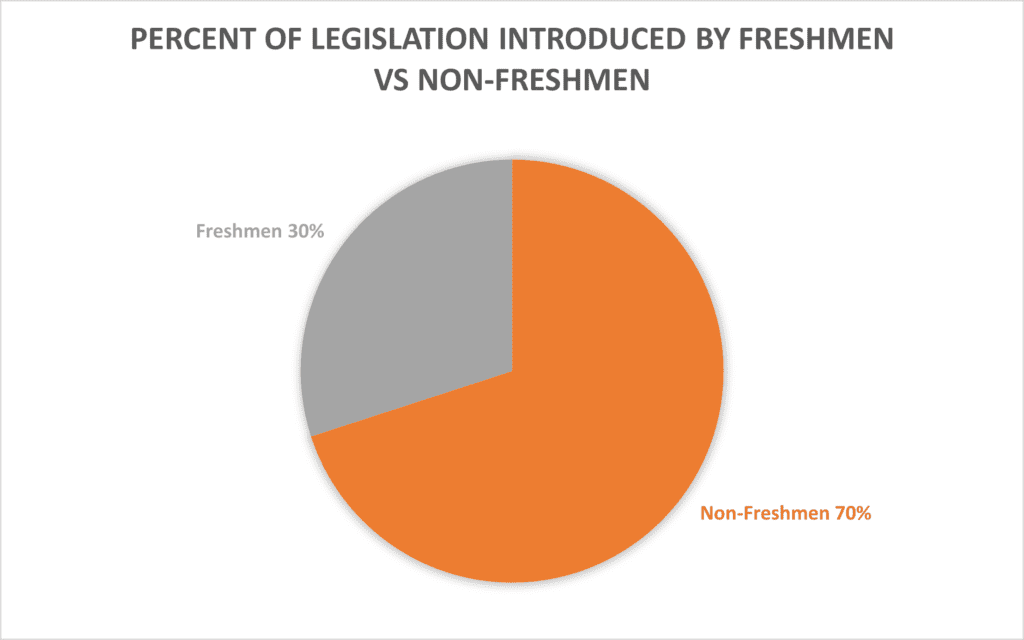 Figure 4
Figure 4
Following is a breakdown of how many bills were introduced by individual legislators within their respective chambers.
 Figure 5
Figure 5

Figure 6
There is a great deal of work to be done before the legislature gavels in next January for the second session. Alaska Policy Forum is working every day to make the case for fiscal restraint and freedom with policymakers, and supporting it with top level research, policy papers, testimony and educational events, to execute our mission: to empower and educate Alaskans and policymakers by promoting policies that grow freedom for all.
